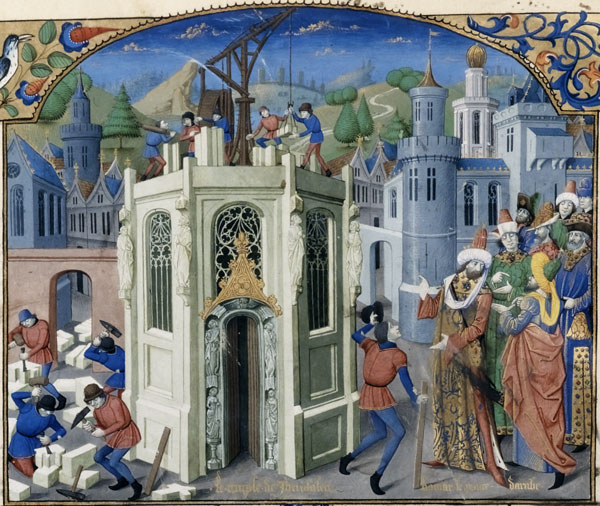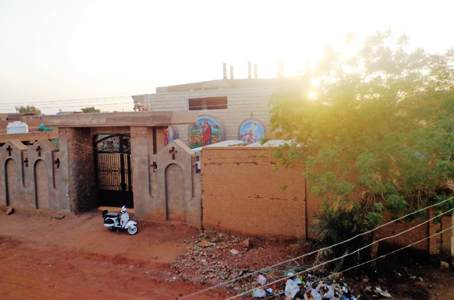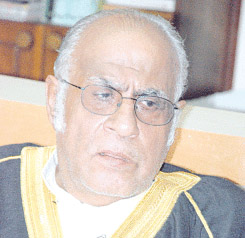
Of all the problems that the Islamist textualist trend faces with respect to modernity, one of the most thorny is their constant systematic recourse to the store of tradition to derive what they consider to be timeless solutions eternally relevant to all times and places and untouched by what takes place in reality.
IF WE MAKE AN EXCEPTION of the Qur’ān, the eternally preserved word of God and of the (very limited in number) verifiable hadith, many of these sources derive their rulings and depend on texts that are not only incapable of being applied in the modern age but are also suspect as to the soundness of their narration. These texts raise many doubts due to their contradictions and the way they conflict with the Qur’ān and the sound hadith.
With the passing of centuries these sources over time took on an aspect of holiness whereby it became unacceptable, or even forbidden, to deal with them with a critical eye. And this despite the fact that they are merely the product of human minds and conceived in step with the conditions and the circumstances of the age they were living in, circumstances entirely removed from our modern era.
Many of the rulings drawn from the store of tradition for solving issues and problems of the present time have nothing to do with matters that are religiously confirmed and ‘fixed’ or with doctrinal tenets or acts of worship. Instead they are linked with acts of independent, human reasoning concerning ‘mutable’ issues. It is therefore vital, nay obligatory, to broaden the arena of free intellectual discussion concerning them and avoid intimidating, or casting doubt upon the intentions of, those who maintain differing views.
What spurred me to put pen to paper on this issue was the Ombadda church incident[1] which some weeks ago excited the interest of the press, and led some quarters to demand that the government put a stop to the building or repair of this church on the grounds that it was part of a comprehensive Christianisation plan targeting Islam and Muslims in the Sudan.
One of them wrote an article in the newspaper Ākhar Lahza under the heading ‘Kindness and Fair-mindedness … or Loyalty[2]?’ in which he brought up the issue of the building of the church and described how a man named David Gregory had taken issue with him concerning this. The writer of the article said that the basic relationship of Muslims with others is one of fair-mindedness, which is justice, but not kindness which is something more than justice. He then added this comment to the fatwa issued with regard to the building of churches:
One of the documents our friend David Gregory showed me was the fatwa of the Association of Muslim Scholars prohibiting the erection of a church in a Muslim country, a matter agreed upon by the consensus of all scholars let alone the committee that issued the fatwa. And he said that the affair was well known and guaranteed in the ‘Conditions of Umar’ which stipulates the prohibition of renovating churches in Muslim lands or lands recently conquered by Muslims.
We notice first of all that the writer refers us directly to the ‘Conditions of Umar,’ or what has come to be known as the ‘Pact of Umar’ which was agreed with the Christians of Syria when this land had been conquered by the Muslims; these are the conditions which Muslim doctors of law have taken as their authority in defining the relationship of Muslims with the ‘People of the Dhimma’.[3]
Before discussing the Conditions of Umar we should say that the writer of that article referred to the fatwa on the non-renovation of church buildings in Muslim lands or lands recently conquered, as if it were a settled issue that contains nothing worth looking into or discussing, and ignored the conditions of the age we are now living in. For ours is an age in which the concept of state/umma has been introduced, a concept that did not exist at the time when these Conditions were promulgated. This modern era is one where rights and duties are founded upon the principle of citizenship and not of religion or race or ethnicity. Sudan is no exception to this.
The jizya annuls the basis of citizenship in the modern state
Such a type of state, as Recep Tayyip Erdogan describes it, rests upon the equidistance of religions, something which guarantees that the majority cannot encroach upon the rights of the minority. It is a state where Muslim minorities are able to live in security and be protected in all countries, from India to America.
In such a country one cannot conceive that a committee could confer upon any of its citizens the right to grant or prevent the building of a church or mosque from the religious standpoint. In fact the entire issue is an ‘administrational’ matter falling under the jurisdiction of local authorities, and the granting of planning permission to build differs in no way from building a public office, a sports-ground or a school.
As for the Conditions of Umar, the present writer has experience of this from his postgraduate research conducted at the University of Denver into religious education programmes. Among the sources collected for the purpose of analysis was one of the works of the Hanbali school of law studied until recently in the faculties of Al Azhar University: Al-Rawd al-Murabbaʽ bi-Sharh Zād al-Mustanqaʽ.
According to this work – which takes as its source the Conditions of Umar, the relations of Muslims with others are governed by what is known as the Dhimma Pact. The word dhimma is a linguistic term for ‘covenant’, ‘guarantee’, ‘security’, and the meaning of Dhimma Pact is that the infidel are left to their Unbelief on condition that they pay the jizya tax and obey the rulings of the Muslim community. The basic principle, they say, stems from the Almighty’s words:
… until they pay the tribute readily, being brought low. [Qur’ān IX,29]
This type of relationship between Muslims and others, founded upon the Dhimma Pact, goes against the nature of relations in a modern state. It is on the basis of this Pact that the call for Christians to pay the jizya is made, an issue which annuls the basis of citizenship in the modern state whereby all members enjoy equal rights and duties irrespective of their religious affiliation.

Suggested Reading
The work therefore contains some very strange legal rulings – founded upon these Conditions of Umar – on how to deal with the ‘People of the Dhimma’. These include the stipulation that Christians are to be distinguished from Muslims ‘by being prevented from wearing headgear, as opposed to the custom of their [Muslim] betters’ and that ‘when entering the bath-house they are to wear a cowbell or a neck-ring of lead’, they are to ‘ride mounts other than horses, such as asses without saddlery’ and ‘may not be given the floor in assemblies’ and are to be ‘prevented also from constructing buildings that overtop a Muslim even though the latter might agree to that, since the Prophet has said: Islam is superior and nought should be above it’. There are also other surprising rulings alongside these. If we attempted to apply merely the last ruling above on construction, we would be plunged into a sectarian crisis in Sudan since, according to this ruling, the government would have to annul and tear down all the houses and buildings of our Coptic brothers that are higher than those of their Muslim neighbours.
The text of the Conditions of Umar, according to ‘Ubāda ‘Abd al-Rahmān Kuhayla[4], contains much that is contradictory in its wording (such as weak chains of transmission) and these raise many questions of historical import as to the validity of associating it with the Orthodox Caliph ‘Umar ibn al-Khattāb.
The text of the Conditions of Umar contains much that is contradictory
It would be difficult for us to make the claim – as ‘Ubāda does – that there is a specific text on the Pact of Umar since several versions of the text have come down to us preserved in works of fiqh, of history and belles lettres. Some of them contain the wording ‘it is conditional upon them’ while others show an alternative wording written by the Christians themselves: ‘we place this condition upon ourselves with regard to you that …’
And when we check the names of those listed in the train of submission we find that some are recorded as being ‘unknown’ or are considered unreliable, chief among whom ‘Abd al-Rahmān ibn Ghanam (the narrator of the Pact and listed as its compiler in most accounts) about whose life very little is known.
As to the text itself, as ‘Ubāda points out, it is riddled with contradictions. The first of these concerns the name of the author. In most depictions of the Pact the author is given as Ibn Ghanam, whereas in other descriptions the author is given as ‘Umar, or ‘the [Arabian] Peninsular folk’, or the inhabitants of the city of such as such. The second contradiction is the language of the address: in most accounts the Pact is delivered from the mouth of the vanquished and not of the vanquisher, whereas the normal practice was for an address like this to be associated the vanquisher. The third contradiction concerns the identity of the vanquished: at times it is the Christians ‘of Syria’, or ‘ of the land of the Syrians’ or ‘of the Peninsula’ or ‘the Christians of Syria and Egypt’ or ‘the Christians of the city of such and such’.
There is also a conflict concerning who it is that actually gave the address – in some of the descriptions of the Pact it is ‘Umar, in others it is Ibn Ghanam. As regards the profuse contradictions in the Pact’s text, as ‘Ubāda explains, it is the Christians who are imposing upon themselves the condition not to sell alcohol. Yet this condition conflicts with what is recorded about ‘Umar himself, who is said to have stipulated the collection of a tithe from wines produced by the People of the Dhimma, for as long as they persist in selling it. That is, he allowed them to carry on selling it.
These criticisms establish from the doctrinal point of view that the Pact of Umar is nothing other than a historical text and, just like all other historical texts, it may be subjected to scrutiny. It is not some sanctified text such as the Qur’ān which has been preserved immune from distorting or altering hands.
The Pact of Umar is nothing other than a historical text and may be subjected to scrutiny
From another, more important, angle this Pact is not a text transcending time which can be applied in the 21st-century, an era that has established some radically different concepts on the state, the community and rights from those prevalent at the time when the Pact of Umar appeared. These concepts pose significant challenges to those who uncritically call for a return to tradition, and those who accord themselves the right to issue fatwas on serious matters that threaten national unity and social cohesion.
[1] On May 14 2013 Ammar Saleh, the chairman of the Islamic Center for Preaching and Comparative Studies accused the Orthodox Church of building a church in Ombadda without a permit in an appeal to the official bodies and the community ‘to take a stand against Christianization’ arguing that the figures of converts to Christianity were ‘racking up in a continuous and scary fashion following the emergence of homosexuals and atheists.’ (Ed.)
[2] The term used, al-walā’, (‘loyalty’, ‘alliance’) is part of the formula al-walā’ wal-barā’ ‘Loyalty and Renunciation’ and refers to a doctrine which stipulates the division of humanity into ‘believers’ and ‘infidels’, and demands the Muslim’s unambiguous demonstration of favouritism to one and prejudice to the other. See Glossary: Al-walā’ wal-barā’ (Ed.)
[3] See Glossary: Dhimma.
[4] Dr. ‘Ubāda ‘Abd al-Rahmān Kuhayla, The Pact of Umar – A New Reading for Social Studies and Research, 1995.
Main picture: ‘Umar entering Jerusalem from William of Tyre’s Histoire d’Outre Mer, (12th century)


